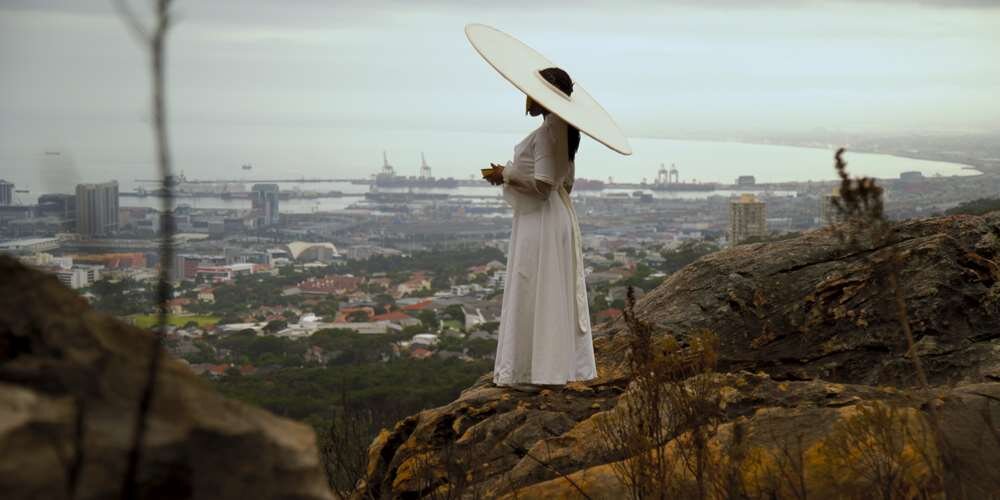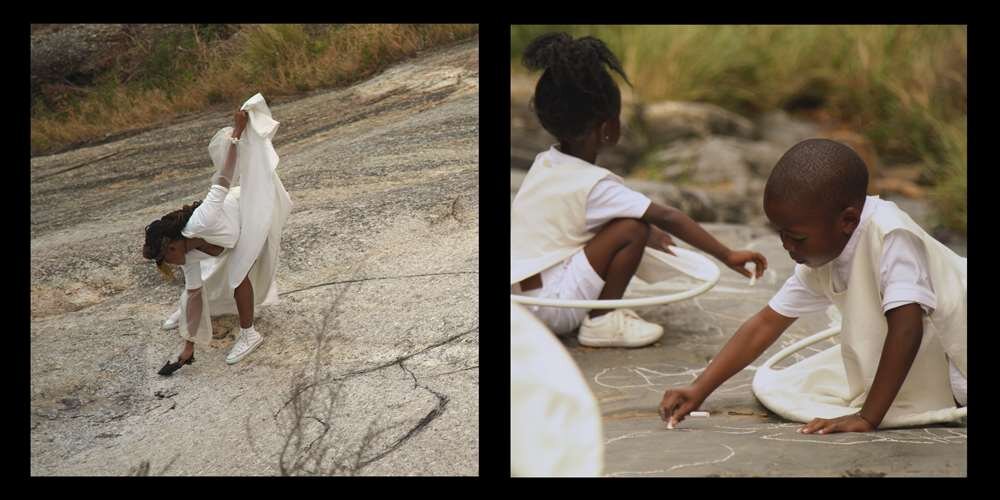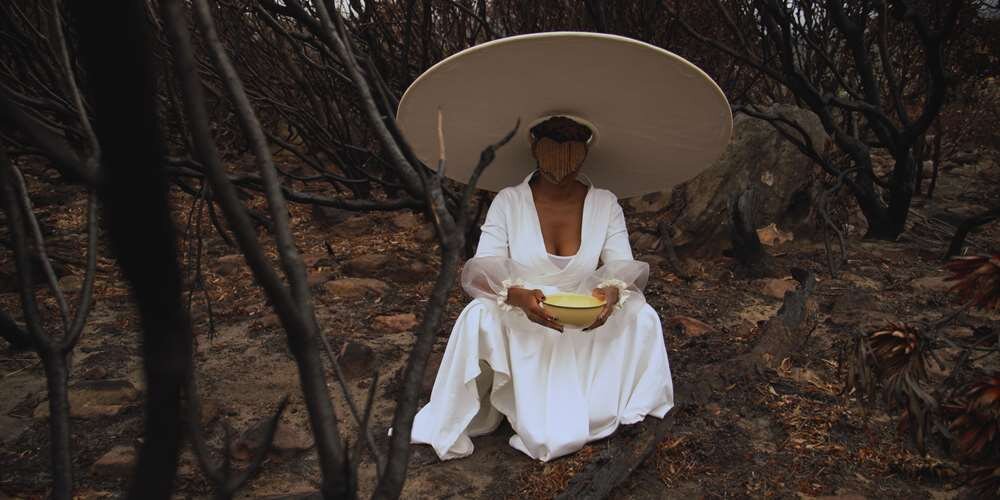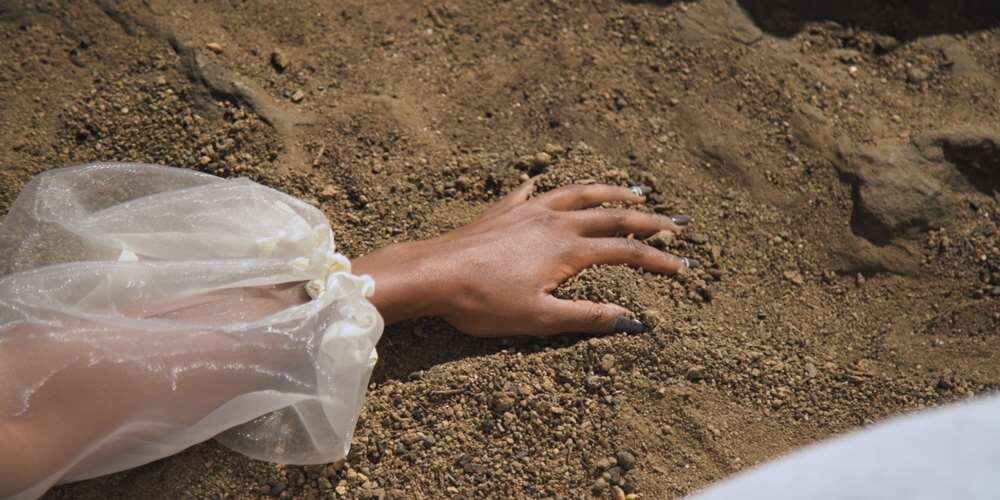Sethembile Msezane’s new short film looks to ancestral medicine and spirituality as a response to the pandemic
During the Covid-19 pandemic, art in all its forms has reclaimed its central place as a lens for the ‘right now’. In her short film ISIMO, artist Sethembile Msezane engages history, culture, curiosity and colour to paint a picture of her own response to the moment. The film has just been showcased via the Gallery of the University of Stellenbosch (GUS) website as part of her current residency at the institution (in partnership with the Mellon Foundation, as well as the Departments of Visual Arts and the English Stellenbosch University). It draws on archival works - most strongly the works of renowned South African writer Babu Credo Mutwa - as well as Msezane’s own practice, politics and personal experience of living in the here and now. ISIMO uses rich metaphor, iconography and the two perspectives of adult and child to guide us through the ways in which ancestors and indigenous learning can lead us through this period but also how we must adopt a childlike approach to learning, re-learning and creating a world for the next generation.
The genesis point for ISIMO is interesting. While Msezane has been engaged in personal-political work for some time, the pandemic, rather than cutting off the flow of inspiration, emerged as an important site for many of the film’s questions — particularly the central interplay between being unwell and being healed. Msezane explains it in this way:
“I found myself extending my thoughts around ideas of healing. This pandemic afforded me a lot of time to think about wellness. I was troubled by why it is that at times there are ailments that can’t be fixed with Western medicine. I questioned my perception of what Western medicine vs Traditional/Indigenous medicine is. I wondered about spiritual sickness and what causes it. I was concerned about occurrences of a body experiencing dysfunction and yet there being no tangible diagnosis. I marvelled at how ancestral ceremonies, messages and dreams can be a form of wellness. I struggled with the experience of being spiritually balanced but being affected by world pressures such as institutional racism and how that destabilises one’s mental wellbeing. How does one then simply live without having to just survive? Can we say for sure that we are alive even as we struggle to stay afloat?”
While this response speaks to the lack of clarity and resolution many people feel during the pandemic, the film does not feel entirely hopeless. Instead, it invites the viewer to think about their own potential as well as their own limitations. Similarly, while many people seem to highlight their most basic financial and physical needs as tantamount, there is a strong reminder in ISIMO that spiritual wellness is as, if not more important, for managing this time so strongly characterised by unwanted growing pains.
“I marvelled at how ancestral ceremonies, messages and dreams can be a form of wellness”
The film opens with a woman in agony as she struggles under the pressure and pain of growing a new life. While there is an abundantly literal lesson here about the ways in which black women can and do suffer physically, there is a more expansive lesson too - about the psychological and emotional trauma which goes untreated. In South Africa, the spectres of colonialism, the devastating HIV epidemic, systemic poverty and gender-based violence are traumas which people endured long before Covid-19 added itself to the list. For Msezane, this relationship to history was crucial for dealing with these traumas or at the very least, making them known.
“History has many lessons and we have to be studious students if we hope to have a better sense of the presence,” she says. “If we succumb to a culture of amnesia we run the risk of re-inflicting the same mistakes and refashion conditions such as racism into palatable terms such as discrimination or systemic violence. By doing this, the severity of the actions are reduced - which in a sense are human rights violations - and this becomes directly strategic in making sure that no change comes about because we are constantly re-inventing the wheel. In engaging with the past, we can track how oppressive systems not only failed marginalised groups but failed society as a whole. In so doing, we not only avoid a reoccurrence of this oppression but we can rectify the systems that have been inherited in upholding the effects of this oppression.”
These are all big concepts to carry, and they are handled with a mix of showing and telling. The film, which runs just over 16 mins long, is separated into several parts, guiding the viewer through the journey of the central ancestral figure. At times, the message is clear, at other points the viewer is left to meander towards their own understanding. But it is the work of patience and persistence, and Msezane is clear that there was much unseen work before the filmmaking which allowed all the different threads to come together as something coherent, despite her describing the process as “tumultuous”.
“My mind became the studio. It was very stressful trying to make sense of my lived experience as an individual navigating the new pandemic and focusing on my own spiritual wellness that has found its way into my work,” she says. “In between conceptualising and watching global headlines, engaging in interviews with Nicki Giovanni and James Baldwin along with Babu Credo Mutwa and other material; I injured my back from continually working on my laptop on the bed. This affected my walking. I got treatment and a few weeks later, I began having long slow walks with a friend on the base of Hoerikwaggo (known as Table Mountain). A sense of calm and connectedness filtered back into my life, I started to remember how to breathe again after being afraid to breathe in a virus we knew very little about at the time. We spoke about plants, their healing properties, we took a lot of photos. Simultaneously, I began making the ancestral figures garment at home.”
Msezane’s interdisciplinary practice, encompassing performance, photography, film, sculpture and drawing, has drawn the young artist many accolades since graduating from her Masters in Fine Arts from the Michaelis School of Fine Art in 2017. To name a few, she enjoyed solo exhibitions at Zeitz MOCAA in Cape Town and Tyburn Gallery in London, she’s a National Institute for Human Social Sciences Award nominee (2020) and was a TEDGlobal Speaker in Ausha, Tanzania (2017).
ISIMO is Msezane’s second short film, following 2017’s Falling, and marks a revived commitment to this artform. “I think I’m starting to fall in love with film as medium of storytelling and in making accessible issues around spirituality as an African form of knowledge system,” she says. “I’m learning that film forces me to demand the best for the most fragile yet strong parts of myself if they are to be exposed as raw as they are for all who care to see.”
Words Binwe Adebayo
Visit Sethembile Msezane
Published on 22/02/2021






